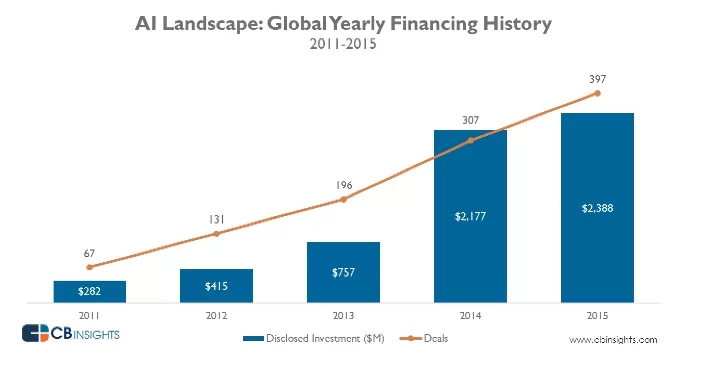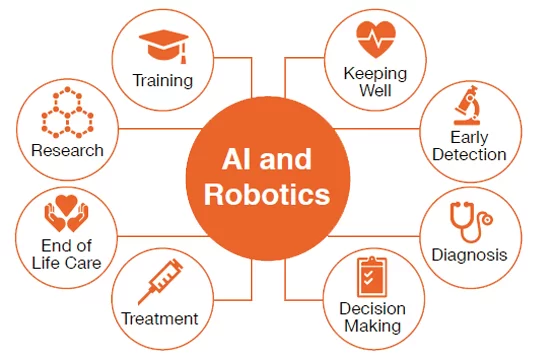There’s a lot of buzz around artificial intelligence these days. It’s been a matter of casual conversations in Silicon Valley for the past few years, and now the technology is being discussed in higher circles as Washington sees opportunities for AI to improve efficiency and increase economic growth. As for the general public, when thinking about AI, some sci-fi imagery comes to mind, evoking all these movies about robots we’ve watched. However, artificial intelligence is not a cybernetic mind with the free will, but rather a system of algorithms based on machine learning. Anyway, one way or another seems like everyone’s excited about new opportunities it may bring to the human race. People are curious beings, and such futuristic notion as AI just can’t be ignored.
But it can also be feared, though. Elon Musk, an innovator himself and a tech God to many of his devoted followers, has compared the adoption of AI to “summoning the devil.” He even thinks that artificial intelligence could help trigger the next world war – serious as that. While opinions may vary, the rise of AI is inevitable as long as humanity wants to progress. However, we’re just witnessing the dawn of artificial intelligence’s development, and there’s no “real” AI we may fear. At least, for now, Elon.
But as of today, services like Google search, Amazon suggestions, Apple’s Siri, Microsoft’s Cortana, Google’s OK Google, and Amazon’s Echo already extract questions from speech using natural-language processing and turn them into useful information like getting driving directions or running a simple web search. This way, scientists and futurologists believe that the further development of AI will free human from performing routine tasks in many domains. One of these domains is the healthcare industry. Analysts from IDC, a provider of market intelligence, advisory services, estimate that by 2018, 30% of medical organizations will offer their patients services based on artificial intelligence.

Among others, companies like IBM, Google, Apple, Microsoft, General Electric are already developing intelligent medical products and services. According to the research firm Venture Scanner, there are more than 800 AI-oriented firms worldwide. Companies from the USA, Great Britain, and Israel are regarded as the most active among them. However, despite the fact that there’s a variety of new solutions like nurse-bots, AInsurance, AI wearables for the elder patients, the vast part of them may look futuristic, but they aren’t transformative. In general, they are algorithmic and not true machine-learning approaches.
Thus, let’s stay realistic. Despite all the hype about the impact on healthcare (for instance, AI was the hottest topic at the recent HIMSS18 conference), the real artificial intelligence is still not deployed in any industry as widely as it could be. However, big things often have small beginnings. Or…haven’t they?
So what is this obstacle separating high expectations from reality? As mentioned in the first paragraph, algorithms need large quantities of high-quality data to be “trained”. This way, the most critical factor is the availability of such data. And here comes the harsh reality. The thing is that in many healthcare organizations, the data isn’t stored in a single place nor useable format. It may also contain biases, which can result in making wrong decisions. No need to emphasize that this is unacceptable if we talk about providing healthcare services.
The very first step here is the evaluation of existing information systems and data flows to separate the areas that are more or less ready for automation from those who aren’t . Medicomp Systems CEO David Lareau explains that “these much hyped ‘innovations’ cannot learn to be effective and accurate from poor quality data which is a major challenge in healthcare, especially in the clinical realm where data is complex and often unstructured. The progress of machine learning largely depends on the precision of the data being processed by the algorithms.”
A market study by INFOSYS, a technology services & consulting company, illustrates this paradigm in a perfect way. According to their research, 49% of all survey participants report the unpreparedness of their data as the main barrier making the deployment the AI technologies impossible. But the word “impossible” sounds sad in this situation as AI is one of the most promising technologies to make a dramatic change. Nothing but artificial intelligence can quickly process large amounts of data, and turn that into usable information, so no wonder that approximately 77% of IT decision makers said that their organizations are currently investing in data management, especially in India (91%) and the United States (89%). This way, let’s add “at the moment” to “impossible” and wait for the better. Infrastructure and outlined strategy are the next cornerstones. Any company willing to take advantage of AI and machine learning, should adopt a detailed data strategy and invest in data management technologies supporting the IDC ThirdPlatform principles.
Third Platform technologies do precisely what healthcare organizations need: they accelerate digital transformation based on fundamental concepts of Big Data & Analytics, Cloud, Mobile, and Social. IDC notes that AI and machine learning are part of the Fourth Platform for digital transformation, so it makes sense to leverage Third Platform technologies for Fourth Platform success. Let’s presume all the ingredients are on the table, and it’s time to make a dish. So what does it take to implement a proper AI program in healthcare?
The key elements of a successful AI implementation are:
- reliable data which may be regarded as the foundation;
- thorough clinical program strategy with a deep understanding of business and clinical practice;
- software expertise in clinical or manufacturing to guide processes;
- business analysis to visualize data and embed adaptive processes into clinical workflows;
Below are the top 3 promising applications where artificial intelligence could be a game-changer for the healthcare industry.
This particular application works great for a radiologist: it can highlight specific areas on a scan, thus reducing the possibility of human error. It may even fully automate the interpretation of scans without human oversight, which could lead to enabling instant interpretations. Besides, some recent demonstrations of improved tumor detection on MRIs and CTs are showing the way towards new opportunities for cancer prevention.
- Drug improvements
AI can contribute to the identification of new potential therapies from volumes of databases on current medicines. The improvements in the efficiency and success rate of drug development, accelerating the process of adopting new medicaments, may be a great response to the treatment of deadly diseases.
- Identification of patients risk
The adoption of the technique based on data in the patient’s electronic health record will help to identify patients whose chances of returning to a hospital within 30 days of discharge are high. This model works for the monetary aspect as well, as the costs associated with readmission are quite imposing. Other recent user case has demonstrated the ability to predict the risk of cardiovascular disease based solely on a still image of a patient’s retina.
This way, the first step of artificial intelligence adoption would lie in the understanding of how the data flows into AI and machine learning systems in real time, what the quality data looks like, and how it can be stored, augmented and used for future training.

In future, the role of doctors will change. There’s a sort of anxiety in the industry, but fortunately for healthcare professionals, artificial intelligence won’t likely demonstrate the same level of empathy and compassion people have. At the same time, one can be sure: if the use of AI is going to improve healthcare services quality and lower its costs, some of the jobs in this domain will become obsolete. And I don’t mean only the healthcare sector. According to the Oxford Martin School study, AI is predicted to take over 47% of the U.S. employment market within the next 20 years.
As soon as healthcare entities become more familiar with the technology, AI and machine learning programs will start to show its full potential, the one, which is expected from such hyped technology. It may not happen soon – remember the small beginnings line? But one thing is sure – sooner or later, AI will disrupt the healthcare industry as we know it.









